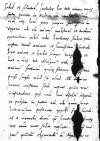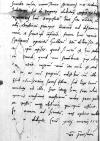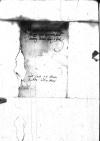Iactatus hoc toto anno variis fatis, partim in Rus (Russia)⌊RussiaRus (Russia)⌋, ubi multa miserrima vidi atque horum pars magna fui, partim in Hungary (Kingdom of Hungary)⌊UngariaHungary (Kingdom of Hungary)⌋, ubi non minus molestiarum et turbinum exanclavi, nihil vobis hactenus scribere potui, nostra tamen amicitia et suavissima co paper damaged⌈[co]co paper damaged⌉nsuetudo haeret animo et haerebit semper integerrima paper damaged⌈[errima]errima paper damaged⌉ et licet a fatis toto disiungimur orbe, coniunc paper damaged⌈[iunc]iunc paper damaged⌉tis animis fortunam quamque feramus [...] paper damaged⌈[...][...] paper damaged⌉rrio quasi scripta nihil sit aliud. Mi domine Ioannes carissime, scribi nequit, quantae rerum vicissitudines post vestrum hinc discessum contigerunt et praesertim in patria vestra, ubi omnia sunt Luteranismo profanata, expulsi prae[...] paper damaged⌈[...][...] paper damaged⌉, sacerdotes et monachi, demum ipse senatus [...] paper damaged⌈[...][...] paper damaged⌉ deiectus, nos omnia more solito negligere t[...] paper damaged⌈[...][...] paper damaged⌉amus nunc pacem quandam chymeralem(?) cum Albrecht I von Hohenzollern-Ansbach (Albrecht von Brandenburg) (*1490 – †1568), 1511-1525 Grand Master of the Teutonic Order; from 1525 to his death Duke in Prussia as a liegeman of the Polish king; son of Friedrich V of Brandenburg der Ältere and Sophia Jagiellon (daughter of Casimir IV Jagiellon), nephew of Sigismund I, King of Poland; founder of the university in Königsberg (1544)⌊magistroAlbrecht I von Hohenzollern-Ansbach (Albrecht von Brandenburg) (*1490 – †1568), 1511-1525 Grand Master of the Teutonic Order; from 1525 to his death Duke in Prussia as a liegeman of the Polish king; son of Friedrich V of Brandenburg der Ältere and Sophia Jagiellon (daughter of Casimir IV Jagiellon), nephew of Sigismund I, King of Poland; founder of the university in Königsberg (1544)⌋, q paper damaged⌈[q]q paper damaged⌉uae ut
 AAWO, AB, D.66, f. 94v
succedet nescio, cum Suleiman the Magnificent (*1494 – †1566), 1520-1566 Sultan of the Ottoman Empire⌊TurcoSuleiman the Magnificent (*1494 – †1566), 1520-1566 Sultan of the Ottoman Empire⌋ speramus nos indutias habituros, sed de Ungaris dubitamus, cupimus ex his regionibus hanc tempestatem licet sero, ... illegible⌈...... illegible⌉lere, cum alii Christiani principes conivent ad discrimen nostrum et semet ipsi conficiunt. Fama huc venit caesarianos exercitum The French ⌊GallorumThe French ⌋ totum delevisse et regem paper damaged⌈[gem]gem paper damaged⌉ ipsum cepisse, quod si verum est, hoc saltem hidden by binding⌈[m]m hidden by binding⌉ erit co paper damaged⌈[t co]t co paper damaged⌉mmodi, quod uno succumbente pax celerius esse p paper damaged⌈[esse p]esse p paper damaged⌉oterit. Negotium vestrum ita mihi est cordi et cur paper damaged⌈[cur]cur paper damaged⌉ae ac meum proprium, adest hic etiam ille praesul admissarius, sanus quidem, sed longe tamen mutatus ab illo, sive itaque hac sive alia quavis occasione accessionem vobis paene polliceri possum neque absentia quicquam officiet. Iam paper damaged⌈[m]m paper damaged⌉ avocor ad senatum, vos optime valete, mequ paper damaged⌈[mequ]mequ paper damaged⌉e diligite.
AAWO, AB, D.66, f. 94v
succedet nescio, cum Suleiman the Magnificent (*1494 – †1566), 1520-1566 Sultan of the Ottoman Empire⌊TurcoSuleiman the Magnificent (*1494 – †1566), 1520-1566 Sultan of the Ottoman Empire⌋ speramus nos indutias habituros, sed de Ungaris dubitamus, cupimus ex his regionibus hanc tempestatem licet sero, ... illegible⌈...... illegible⌉lere, cum alii Christiani principes conivent ad discrimen nostrum et semet ipsi conficiunt. Fama huc venit caesarianos exercitum The French ⌊GallorumThe French ⌋ totum delevisse et regem paper damaged⌈[gem]gem paper damaged⌉ ipsum cepisse, quod si verum est, hoc saltem hidden by binding⌈[m]m hidden by binding⌉ erit co paper damaged⌈[t co]t co paper damaged⌉mmodi, quod uno succumbente pax celerius esse p paper damaged⌈[esse p]esse p paper damaged⌉oterit. Negotium vestrum ita mihi est cordi et cur paper damaged⌈[cur]cur paper damaged⌉ae ac meum proprium, adest hic etiam ille praesul admissarius, sanus quidem, sed longe tamen mutatus ab illo, sive itaque hac sive alia quavis occasione accessionem vobis paene polliceri possum neque absentia quicquam officiet. Iam paper damaged⌈[m]m paper damaged⌉ avocor ad senatum, vos optime valete, mequ paper damaged⌈[mequ]mequ paper damaged⌉e diligite.
 AAWO, AB, D.66, f. 1v unnumbered after 94
AAWO, AB, D.66, f. 1v unnumbered after 94
 AAWO, AB, D.66, f. 94v
succedet nescio, cum
AAWO, AB, D.66, f. 94v
succedet nescio, cum 

